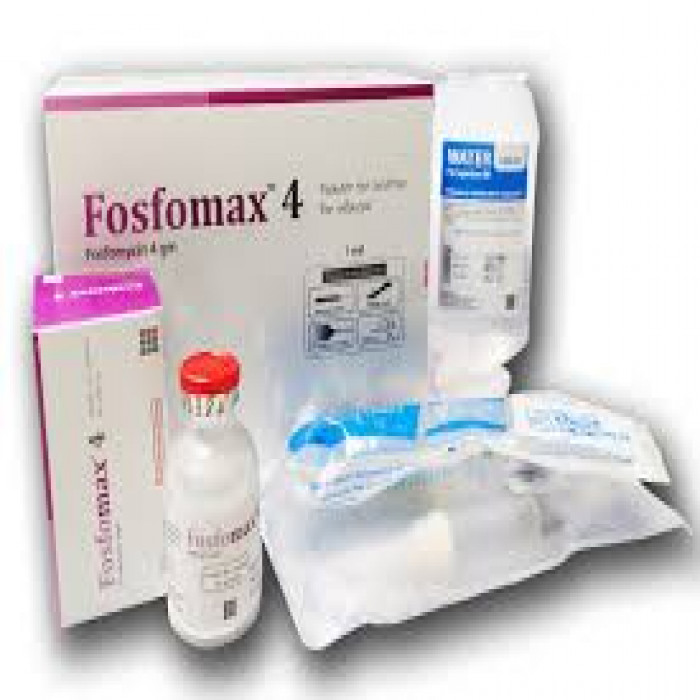
✔ 100% Authentic Product
👁️ Currently Viewing 1835
✅ Description:
Utifos 3 belongs to a group of medicines known as antibiotics. It works by killing bacteria, which can cause infections. This medicine is used to treat or prevent infections of the urinary tract. It helps to improve your symptoms and cure the infection. Utifos 3 should be taken on an empty stomach, preferably before bedtime, after emptying the bladder. You should take it regularly at evenly spaced intervals as per the schedule prescribed by your doctor. The dose will depend on what you are being treated for, but you should always complete a full course of this antibiotic as prescribed by your doctor. Do not stop taking it until you have finished, even when you feel better. If you stop taking it early, some bacteria may survive and the infection may come back. The most common side effects of this medicine include headache, dizziness, vaginal inflammation and indigestion. Consult your doctor if your condition does not improve even after two to three days or if these side effects bother or worry you. Before using it, you should tell your doctor if you are allergic to any antibiotics or have any kidney or liver problems. Pregnant or breastfeeding mothers should consult their doctor before using it. Avoid alcohol and caffeinated drinks while using this medicine. It may make you feel sleepy and dizzy. Do not drive if these symptoms occur.
Uses of Utifos 3
Bacterial infections of urinary tract
Side effects of Utifos 3
Common
Headache
Dizziness
Vaginal inflammation
How to use Utifos 3
Take this medicine in the dose and duration as advised by your doctor. Check the label for directions before use. Empty the granules in a glass of water/milk, stir it and consume immediately. Utifos 3 is to be taken empty stomach.
How Utifos 3 works
Utifos 3 is an antibiotic. It kills the bacteria in the urinary tract by preventing them from forming their own protective covering. It also reduces bacterial attachment to cells lining the bladder. This helps treat or prevent uncomplicated infections of the bladder.

Quick Tips
Utifos 3 is used to treat and prevent bacterial infections of the urinary tract.
Dissolve it in a glass of water and drink immediately, preferably at bedtime, 2 hours after meals (after emptying the bladder).
Avoid alcohol and caffeinated drinks, and drink plenty of water while taking Utifos 3.
Diarrhea is a common side effect. Inform your doctor if it does not get better or if you see blood in stools.
Utifos 3 may cause dizziness or sleepiness. Don't drive or do anything requiring concentration until you know how it affects you.
Symptoms should get better in 2 to 3 days of the single dose treatment. Inform your doctor if you don't feel better after 2 to 3 days.

Brief Description
Indication
Uncomplicated urinary tract infections (acute cystitis), Prostatitis
Administration
Reconstitution: Oral powd: Dissolve the contents of a single-dose sachet containing 3 g of the drug in 90-120 ml (half cup) of water of water and stir to dissolve. Do not use hot water. This should be taken immediately after dissolving in water. Do not use hot water. Should be taken on an empty stomach. Take on an empty stomach 1 hr before or 2 hr after meals.
Adult Dose
Oral Urinary Tract Infection (Acute Cystitis) Acute cystitis caused by E. coli, E. faecalis Women >18 years: 1 sachet (3 g) PO once Males >18 years: 1 sachet (3 g) every 2-3 days for 3 doses Prostatitis 3 g PO every 3 days for 21 days
Renal Dose
Renal impairment: No dosage adjustment needed.
Contraindication
Hypersensitivity to fosfomycin.
Mode of Action
Fosfomycin is a phosphoenolpyruvate (PEP) analogue that irreversibly inhibits enolpyruvate transferase (MurA), which prevents peptidoglycan biosynthesis at an earlier site compared to β-lactams with no cross-resistance with other agents. Thus, it inhibits bacterial cell wall biogenesis & shows bactericidal effects.
Precaution
Patient w/ cardiac insufficiency, HTN, hyperaldosteronism, hypernatraemia or pulmonary oedema. Renal impairment (IV). Pregnancy and lactation. Patient Counseling Certain adverse effects may occur which may impair ability to drive or operate machinery. Monitoring Parameters Monitor serum electrolyte levels and water balance; signs and symptoms of UTI. Do not use more than one single dose to treat a single episode of acute cystitis. Sometimes after starting treatment with antibiotics, patients can develop watery and bloody stools (with or without stomach cramps and fever) even as late as two or more months after having taken the last dose of the antibiotic. Lactation: excreted in breast milk; not recommended
Side Effect
1-10% Anorexia,Diarrhea,Epigastric,Discomfort,Headache,Nausea,Rash,Vomiting <1% Dizziness,Drowsiness,Fatigue,Pruritus Potentially Fatal: Anaphylactic shock, antibiotic-associated colitis and pseudomembranous colitis.
Pregnancy Category Note
Pregnancy Category: B Lactation: excreted in breast milk; not recommended
Interaction
Additive or synergistic effect w/ β-lactam antibiotics (e.g. penicillin, ampicillin, cefazolin, carbapenems) and anti-staphylococcal agents (e.g. linezolid, quinupristin/dalfopristin, moxifloxacin). Reduced serum levels w/ drugs which increase GI motility (e.g. metoclopramide).
⚠️Disclaimer:
At ePharma, we’re committed to providing accurate and accessible health information. However, all content is intended for informational purposes only and should not replace medical advice from a qualified physician. Please consult your healthcare provider for personalized guidance. We aim to support, not substitute, the doctor-patient relationship.










